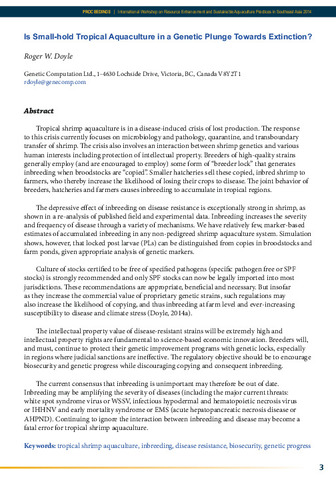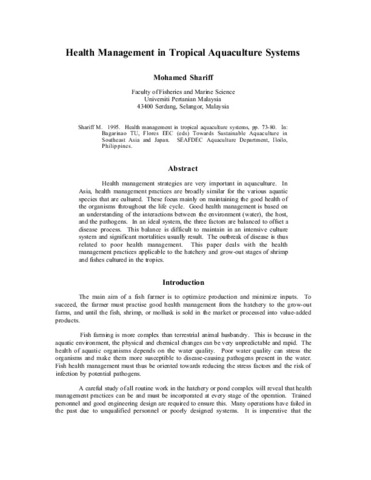Is small-hold tropical aquaculture in a genetic plunge towards extinction?
| dc.contributor.author | Doyle, Roger W. | |
| dc.contributor.editor | Romana-Eguia, Maria Rowena R. | |
| dc.contributor.editor | Parado-Estepa, Fe D. | |
| dc.contributor.editor | Salayo, Nerissa D. | |
| dc.contributor.editor | Lebata-Ramos, Ma. Junemie Hazel | |
| dc.date.accessioned | 2016-01-19T03:33:32Z | |
| dc.date.available | 2016-01-19T03:33:32Z | |
| dc.date.issued | 2015 | |
| dc.identifier.citation | Doyle, R. W. (2015). Is small-hold tropical aquaculture in a genetic plunge towards extinction? In M. R. R. Romana-Eguia, F. D. Parado-Estepa, N. D. Salayo, & M. J. H. Lebata-Ramos (Eds.), Resource Enhancement and Sustainable Aquaculture Practices in Southeast Asia: Challenges in Responsible Production of Aquatic Species: Proceedings of the International Workshop on Resource Enhancement and Sustainable Aquaculture Practices in Southeast Asia 2014 (RESA) (pp. 3-18). Tigbauan, Iloilo, Philippines: Aquaculture Dept., Southeast Asian Fisheries Development Center. | en |
| dc.identifier.isbn | 9789719931041 | |
| dc.identifier.uri | http://hdl.handle.net/10862/2759 | |
| dc.description.abstract | Tropical shrimp aquaculture is in a disease-induced crisis of lost production. The response to this crisis currently focuses on microbiology and pathology, quarantine, and transboundary transfer of shrimp. The crisis also involves an interaction between shrimp genetics and various human interests including protection of intellectual property. Breeders of high-quality strains generally employ (and are encouraged to employ) some form of breeder lock that generates inbreeding when broodstocks are copied . Smaller hatcheries sell these copied, inbred shrimp to farmers, who thereby increase the likelihood of losing their crops to disease. The joint behavior of breeders, hatcheries and farmers causes inbreeding to accumulate in tropical regions. The depressive effect of inbreeding on disease resistance is exceptionally strong in shrimp, as shown in a re-analysis of published field and experimental data. Inbreeding increases the severity and frequency of disease through a variety of mechanisms. We have relatively few, marker-based estimates of accumulated inbreeding in any non-pedigreed shrimp aquaculture system. Simulation shows, however, that locked post larvae (PLs) can be distinguished from copies in broodstocks and farm ponds, given appropriate analysis of genetic markers. Culture of stocks certified to be free of specified pathogens (specific pathogen free or SPF stocks) is strongly recommended and only SPF stocks can now be legally imported into most jurisdictions. These recommendations are appropriate, beneficial and necessary. But insofar as they increase the commercial value of proprietary genetic strains, such regulations may also increase the likelihood of copying, and thus inbreeding at farm level and ever-increasing susceptibility to disease and climate stress (Doyle, 2014a). The intellectual property value of disease-resistant strains will be extremely high and intellectual property rights are fundamental to science-based economic innovation. Breeders will, and must, continue to protect their genetic improvement programs with genetic locks, especially in regions where judicial sanctions are ineffective. The regulatory objective should be to encourage biosecurity and genetic progress while discouraging copying and consequent inbreeding. The current consensus that inbreeding is unimportant may therefore be out of date. Inbreeding may be amplifying the severity of diseases (including the major current threats: white spot syndrome virus or WSSV, infectious hypodermal and hematopoietic necrosis virus or IHHNV and early mortality syndrome or EMS (acute hepatopancreatic necrosis disease or AHPND). Continuing to ignore the interaction between inbreeding and disease may become a fatal error for tropical shrimp aquaculture. | en |
| dc.language.iso | en | en |
| dc.publisher | Aquaculture Department, Southeast Asian Fisheries Development Center | en |
| dc.subject | Tropical shrimp aquaculture | en |
| dc.subject | Genetic progress | en |
| dc.subject | Penaeidae | en |
| dc.title | Is small-hold tropical aquaculture in a genetic plunge towards extinction? | en |
| dc.type | Conference paper | en |
| dc.citation.spage | 3 | |
| dc.citation.epage | 18 | |
| dc.citation.conferenceTitle | Resource Enhancement and Sustainable Aquaculture Practices in Southeast Asia: Challenges in Responsible Production of Aquatic Species: Proceedings of the International Workshop on Resource Enhancement and Sustainable Aquaculture Practices in Southeast Asia 2014 (RESA) | en |
| dc.subject.asfa | shrimp culture | en |
| dc.subject.asfa | disease resistance | en |
| dc.subject.asfa | warm-water aquaculture | en |
| dc.subject.asfa | disease control | en |
| dc.subject.asfa | biosecurity | en |
| dc.subject.asfa | tropical fishes | en |
| dc.subject.asfa | strain | en |
| dc.subject.asfa | disease transmission | en |
| dc.subject.asfa | genetics | en |
| dc.subject.asfa | breeding | en |
| dc.subject.asfa | fish diseases | en |
| dc.subject.asfa | inbreeding | en |
| dc.subject.asfa | breeding stock | en |
| dc.subject.asfa | biotechnology | en |





